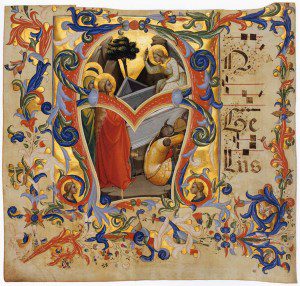God is dead! Such is the news of Good Friday as we contemplate the visceral core of Christian reality: the unjust sentencing, scourging, beating, mocking, cheating, and eventual death of God. Jesus, God who became man, is notorious for challenging our notion of “messiah” itself; the Jews expected a political or military leader, someone who would break the Roman yoke like Judas Maccabeus:
The LORD says to my lord:
“Sit at my right hand,
while I make your enemies your footstool.”
The scepter of your might:
the LORD extends your strong scepter from Zion.
Have dominion over your enemies!
Yours is princely power from the day of your birth.
In holy splendor before the daystar,
like dew I begot you.
The LORD has sworn and will not waver:
“You are a priest forever in the manner of Melchizedek.”
At your right hand is the Lord,
who crushes kings on the day of his wrath,
Who judges nations, heaps up corpses,
crushes heads across the wide earth,
Who drinks from the brook by the wayside
and thus holds high his head. (Psalms 110:1-7)

As Christians, it is easy retroactively to read Christ into this passage, but for first-century Jews, living under the imperium of the Romans, it is not hard to imagine why a military figure would’ve been expected. Christ, of course, shattered this mold, something we recall most rightly on Palm Sunday, when we remember the meek Galilean entering Jerusalem saturated by symbols of peace: the donkey, the palms, and the cheering crowd, despite not having conquered anything in any traditional sense. Christ is the Prince of Peace, the Messiah who conquers death by death, who, from the very beginning, surprises believers and disbelievers alike, always prepared to upend our expectations.
Yet, the Crucifixion teaches us more than the (very important) peaceful nature of Christ; it allows us a glimpse into a mode of understanding God as beyond good and evil, as a deity who cannot be captured by our human conceptualizations. Further, it invites us to see the Kingdom in these same terms.
God is not good. God is good by analogy, a merely earthly attempt to capture an essence far beyond our meager minds. He is only good, if we keep in mind the symbolic nature of that “is.”
In a sense, this is the lesson of the Lord’s death on the Cross. Here we have a God-man, the Messiah, accepting His own end, surrounded by a jeering crowd, which mocks Him and yells at Him, in order to reveal His divinity by defeating death. As it says in the Gospel of Matthew:
Those passing by reviled him, shaking their heads and saying, “You who would destroy the temple and rebuild it in three days, save yourself, if you are the Son of God, [and] come down from the cross!” Likewise the chief priests with the scribes and elders mocked him and said, “He saved others; he cannot save himself. So he is the king of Israel! Let him come down from the cross now, and we will believe in him. He trusted in God; let him deliver him now if he wants him. For he said, ‘I am the Son of God.’” The revolutionaries who were crucified with him also kept abusing him in the same way. (Matthew 27:39-44)
Here we have God allowing His own Son to die, to scream out “Eli, Eli, lema sabachthani,” not so that worldly kingdoms may be upended or that earthly justice may be done, but so that souls may be saved through the sanctification of flesh! Is this any normative notion of good? Does this not expand how we might understand even that most nebulous concept of goodness? Christ’s very death is an invitation to peer beyond our human notions into the incomprehensibility of the Godhead.
Pseudo-Dionysius the Areopagite, a fifth- or sixth-century Christian writer, tells us just this in his Mystical Theology:
Again, ascending yet higher, we maintain that it [the ultimate cause of all things] is neither soul nor intellect; nor has it imagination, opinion reason or understanding; nor can it be expressed or conceived, since it is neither number nor order; nor greatness nor smallness; nor equality nor inequality; nor similarity nor dissimilarity; neither is it standing, nor moving, nor at rest; neither has it power nor is power, nor is light; neither does it live nor is it life; neither is it essence, nor eternity nor time; nor is it subject to intelligible contact; nor is it science nor truth, nor kingship nor wisdom; neither one nor oneness, nor godhead nor goodness; nor is it spirit according to our understanding, nor filiation, nor paternity; nor anything else known to us or to any other beings of the things that are or the things that are not; neither does anything that is know it as it is; nor does it know existing things according to existing knowledge; neither can the reason attain to it, nor name it, nor know it; neither is it darkness nor light, nor the false nor the true; nor can any affirmation or negation be applied to it, for although we may affirm or deny the things below it, we can neither affirm nor deny it, inasmuch as the all-perfect and unique Cause of all things transcends all affirmation, and the simple pre-eminence of Its absolute nature is outside of every negation- free from every limitation and beyond them all.
Note that God cannot be captured by affirmation nor by negation; He is no more “good” than He is “not good.” And the same may be said about the Kingdom He will bring and brings in us, His faithful, the faithful who find the invitation to the Kingdom in God’s death on the Cross (and eventual Resurrection).
Now, the Kingdom may be taken in two sense, that which is already happening through God’s leading His people in time by the example of the life of Christ, and that which will be brought to fruition at the end of time. As we learn in the Gospel of Luke:
Asked by the Pharisees when the kingdom of God would come, he said in reply, “The coming of the kingdom of God cannot be observed, and no one will announce, ‘Look, here it is,’ or, ‘There it is.’ For behold, the kingdom of God is among you.” Then he said to his disciples, “The days will come when you will long to see one of the days of the Son of Man, but you will not see it. There will be those who will say to you, ‘Look, there he is,’ [or] ‘Look, here he is.’ Do not go off, do not run in pursuit. For just as lightning flashes and lights up the sky from one side to the other, so will the Son of Man be [in his day]. But first he must suffer greatly and be rejected by this generation. As it was in the days of Noah, so it will be in the days of the Son of Man; they were eating and drinking, marrying and giving in marriage up to the day that Noah entered the ark, and the flood came and destroyed them all. Similarly, as it was in the days of Lot: they were eating, drinking, buying, selling, planting, building; on the day when Lot left Sodom, fire and brimstone rained from the sky to destroy them all. So it will be on the day the Son of Man is revealed. (Luke 17:20-31)
And so here, we have the present nature of the Kingdom tied to the Crucifixion, with hints of a Kingdom to come. This dual sense is precisely an invitation beyond good and evil, a nudge so that we might recognize what God said in Genesis: that all He has created is good. But here we must take “good” to mean more than our normative conception, to be more than merely “nice” or “positive.” Meister Eckhart may be of help:
Our Lord saith that the Kingdom of God is near us. Yea, the Kingdom of God is within us as St. Paul saith “our salvation is nearer than when we believed.” Now we should know in what manner the Kingdom of God is near us. Therefore let us pay diligent attention to the meaning of the words… If the soul is to see God, it must look at nothing in time; for while the soul is occupied with time or place or any image of the kind, it cannot recognize God. If it is to know Him, it must have no fellowship with nothingness. Only he knows God who recognizes that all creatures are nothingness… The whole Being of God is contained in God alone. The whole of humanity is not contained in one man, for one man is not all men. But in God the soul knows all humanity, and all things at their highest level of existence, since it knows them in their essence. Suppose any one to be in a beautifully adorned house: he would know much more about it than one who had never entered therein, and yet wished to speak much about it. Thus, I am as sure, as I am of my own existence and God’s, that, if the soul is to know God, it must know Him outside of time and place. Such a soul will know clearly how near God’s kingdom is.
Though perhaps confusing at first glance, we can extract one fundamental truth from Eckhart’s words: God’s kingdom may be glimpsed through the process of affirmation and negation proposed by Pseudo-Dionysius, by “look[ing] at nothingness in time.” The Kingdom is espied, and exists, by passing beyond merely human conceptions of good and evil, beyond understanding God solely as delimited by our conceptual notions of what He ought to be. We use images, ideas, and concepts to understand something of God; we negate them so that we may see that, though they describe Him, these concepts are not Him. His truth lies even beyond affirmation and negation, beyond good and evil.
The Crucifixion itself is a testament to this truly divine essence, that which is above our understanding, that which invites us, via our deification, to be like God, to pass beyond the merely good and evil of the world, and thereby to see “how near God’s kingdom is.”












